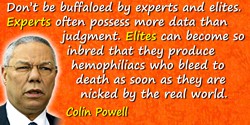 (source)
(source)
|
Colin L. Powell
(5 Apr 1937 - 18 Oct 2021)
American army officer a retired four-star general in the U.S. Army, born of Jamaican immigrants who impressed the value of education and accomplishment. He served as Chairman of the Joint Chiefs of Staff for President George H.W. Bush, and Secretary of State for President G. W. Bush.
|
Humane Leadership
One Minute Read
by Colin Powell
Excerpt from My American Journey
One day Captain Miller summoned me. He was assigning my platoon to a secret mission. … I eagerly alerted my men. I loaded my .45 caliber pistol, jumped into my jeep, and headed for battalion headquarters to be briefed. I was excited; I was going to guard a weapon that fired a nuclear warhead!
I had not gone far when I reached down for the reassuring feel of the .45. It was gone. I was petrified. In the Army, losing a weapon is serious business. I was torn between taking time to look for the pistol and getting on with the mission. Finally, I realized that I had to radio Captain Miller and tell him what had happened.
“Powell, are you on your way yet?” he asked right off the bat.
“Yes, sir. But, you see … I lost my pistol.”
“You what?” he said in disbelief, then, after a few seconds, added, “All right, continue the mission.”
After being briefed at battalion headquarters, I returned to pick up my unit, uneasily contemplating my fate. I had just passed through a little German village when I spotted Captain Miller waiting for me in his jeep at the wood line. He called me over. “I’ve got something for you,” he said. He handed me the pistol. “Some kids in the village found it where it fell out of your holster.” Kids found it? I felt a cold chill. “Yeah,” he said. “Luckily they only got off one round before we heard the shot and came and took the gun away from them.” The disastrous possibilities left me limp. “For God’s sake, son,” Miller said, “don’t let that happen again.”
He drove off. I checked the magazine; it was full. The gun had not been fired. I learned later that I had dropped it in my tent before I ever got started. Miller had fabricated the whole scene about the kids to scare me into being more responsible. He never mentioned the incident again. …
Miller’s example of humane leadership that does not always go by the book was not lost on me. When they fall down, pick ’em up, dust ’em off, pat ’em on the back, and move ’em on.
[Colin Powell gives us a memorable sentence: “When they fall down, pick ’em up, dust ’em off, pat ’em on the back, and move ’em on.” But for us outside the military, he also reminds us that gun ownership is a serious responsibility. “Kids found it,” leaves a lot to think about, without a lapse; ever. —Webmaster]
- Science Quotes by Colin L. Powell.
- Education - Colin Powell - One Minute Read
- My American Journey, by Colin Powell. - book suggestion.






